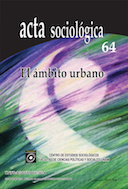Epistemological discussions about the reflexivity in sociology. Adorno, Bourdieu and a proposal based on the reflexive critical theory
Main Article Content
Abstract
This paper proposes an epistemological conception for sociology, based in a (self)reflexive movement that put in question the questioning point of view itself. For this we study the perspective of two authors with different but not incompatible theories, we refer to Th. W. Adorno and P. Bourdieu. Both of them give a central place to that reflexive movement, since it is a key instance of the effort to catch how impacts the social entwining in the practice of sociology, in its modus operandi. Over this base we discuss with the epistemological substratum (not always explicit) of two predominant perspectives in presents days sociology (especially in cultural one). On the one hand the culturalism, and on the other hand the post-structuralism. This shows the currently and potentiality of this discussion about the epistemological contributions of reflexivity for contemporary sociology. Since it gives us a way through which ask ourselves about the blind points that our practice of sociology contains, to maximize its potentialities within these limits. This discussion is an instance of the more general proposal of a reflexive critical theory of the society.


